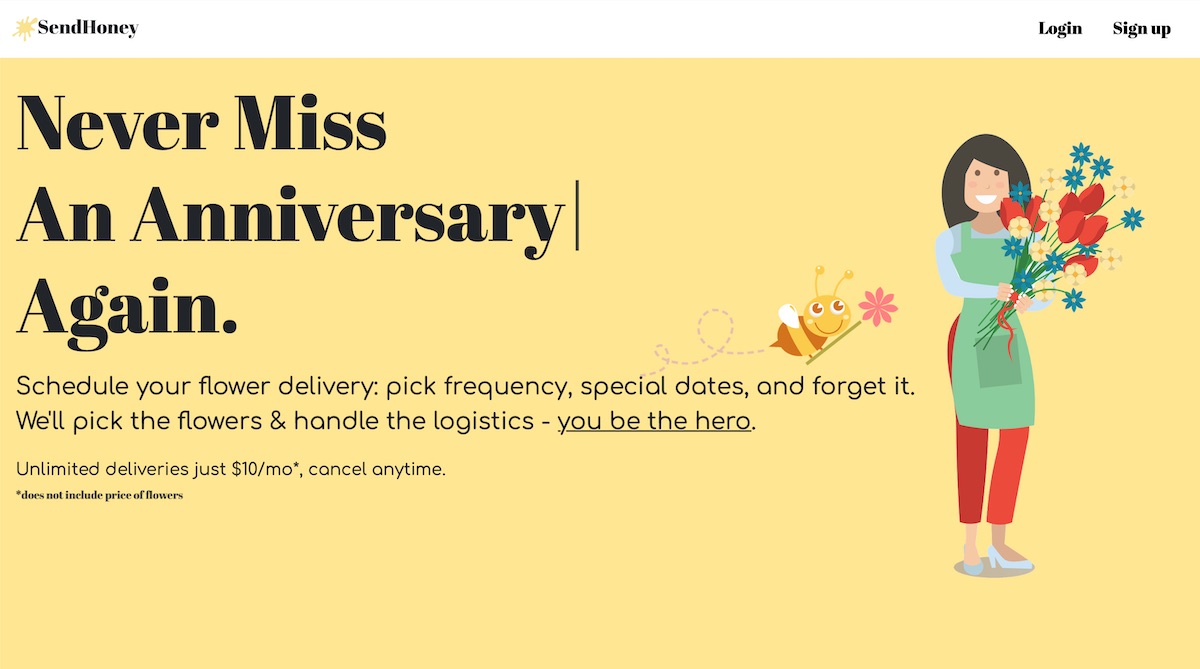What Does It Mean to Compete Against 'Nothing'?
In the book Competing Against Luck, Clayton Christensen makes the case for a special kind of product: a product which competes, as Clayton says, against “nothing”.
What does that mean, exactly? It does not mean that the product has no competitor. It means something else.
To serve as an example, here’s SendHoney (Update: now ScheduleFlowers). It competes against “nothing”.
SendHoney gets flowers delivered to people you love. Set it and forget it. That’s what it does.
Does it mean that SendHoney has no competitor? You could say there are other similar services. There might be flower shops who allow booking a flower delivery far in advance.
But this product isn’t just offering a service. It’s offering a promise: “you be the hero”. To be the hero in specific contexts.
The Struggles: When You’d Even Care To Be that Kind of Hero
As we’ve covered, the first rule for a product (or a service) to exist is this: there needs to be a struggling moment that’s strong enough to propel someone to get off their chair and do something about it.
So let’s use the word “when” to find those struggling moments, using it in this template:
- “When I’m [struggle being experienced], I want to [next step I’m considering] so I can [outcome desired].”
Let’s find situations that pinch just enough to make someone seek out a service like SendHoney:
- When I’ve been away from home for months, and my connection with my spouse is at the point that it’s a little shaky, I want to find a way to send flowers regularly so I can demonstrate that I’m invested in the relationship.
- When I hear that my mother is going through a rough time with her health, I want to find a way to send her something special on a regular basis so I can make sure she feels I’m with her.
- When I realize that my daughter will soon be away from home for college, I want to plan something special in her first few weeks and on special moments in her first year so I can make sure she feels we’re rooting for her.
In those situations, where would someone turn to get those jobs done?
- I could search the web and find nearby flower shops that will commit to organizing flower deliveries on certain dates. That might be easy. It might take calling a few flower shops before I find one that will offer that service. And even then, there will be the anxiety of not knowing if they’ll respect their commitment, whether I have to pay all of it up front, choosing which flowers to send for which event, etc.
It’s complicated, and so… - I could call folks I know that are closer to my loved one and delegate that task to them. But then you’re asking for a commitment for a service. You get mental pushback at the thought of adding a burden on someone else, of creating an inconvenience for them.
Again, it’s complicated, which is why… - I’ll likely default back to doing something simple myself, like setting reminders before certain dates and committing to follow through. But then I’m trusting “future me” to have the head space to, each time, call the flower shop or whatever other delivery service, set an appointment or make an order.
Doing it myself seems complicated.
Seeing as all the other likely next steps for those specific situations are getting a little too complicated, what am I likely to choose to do?
I’m likely to choose to do nothing. To drop it. To put it off.
That’s what competing against “nothing” is about.
All products have this universal competitor: it’s called non-consumption.
Non-consumption means this: people choose to do nothing, or people choose to do it themselves. People choose to not change anything about their situation, despite the struggle, because there just isn’t a good option that’s available.
Found an area with a hard struggle with situations where potential buyers forfeit back to non-consumption?
Found a pinch that’s competing against “nothing”?
You might be onto something.
Stay Sharp!
—
Pascal Laliberté
@pascallaliberte
